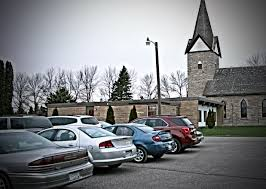Sunday Morning. Late morning, just past 11AM. For me, Passover, treated to a batch of matzoh brei for the first time this year. Fleishig dishes completed, drying on the rack, with afternoon dedicated to washing milchig dishes. Treadmill done. With a break in the action, it seemed a good time to leave the house. It being Pesach, I could not stop anywhere for coffee and really didn't feel like shopping. I just drove, mostly the route that had become customary for my Covid lockdown escapes a few years ago.
My route would take me mostly through a commercial area. This being prime worship time, I opted to see which of the many churches my car would drive past had substantial numbers of cars in their lots. Some did, some didn't. The Catholic Church near me seemed to be doing well, the other on the main thoroughfare less well. A Baptist church just down the road from me seemed popular. A United Methodist Church occupying prime real estate, which I once visited regularly as a parent of the Scout Troop that they sponsored, had a parking lot proportional to its glorious building and spacious grounds. There were cars there, but a lot of empty spaces. Knowing the size of their sanctuary, where I have attended Scout events and concerts, I suspected their pastor would be preaching to a lot of open space, though perhaps they move their Sunday worship to a smaller room to create an impression of being more full, much like my own synagogue did. And perhaps, some of the places I passed start their weekly worship early enough to have everyone on their way by 11AM.
This being a commercial main road, there were places with a lot of cars. Places to eat breakfast, department stores, grocery stores. The liquor stores on this route are all small ones and by state law would not open for another two hours. But breakfast or acquisition of stuff seemed to attract more people than piety did.
Parking lots provide observation, though not data. Clearly, though, the Roman Catholic Church and the Baptist Church functioned as Sunday morning destinations. When I arrived home, I looked at the websites of places I had driven past. 11AM was indeed prime time for in-person worship. I could even see a couple on stream, though the images focused on the pastor speaking from the pulpit without a panorama of the pews to assess attendance. Unlike my denomination of Judaism which prohibits electronics on our Sabbath, each of these churches has an online option, so cars in a parking lot could be a misleading metric.
That said, there is considerable reliable data that church and synagogue attendance have atrophied across America, a slow attrition over decades with times of acceleration, but no times of meaningful reversal. Retailers and restaurants, once prevented by law from being open during church times, now compete for people's presence. My route did not take me past recreation sites like parks, golf courses, or Y's, though I could understand why people might prefer a golf cart or pool to a pew.
My route, and the observations it generated, may not be representative. I live in an area where people have advanced degrees, engage in lucrative occupations, travel to other places a few times a year, and have the means to pay for their own amusements. These are the people most likely to find the church less attractive than other activities they might be doing instead on their day off from what is often stressful employment.
And finally, as I browse the various websites, weekly engagement in ritual often seems less central to the congregational missions than it does for synagogues. Nearly all have some sort of outreach agenda. People may not be at church on a Sunday morning, but they serve in soup kitchens and distribute donated clothing to the poor. Some engage in either evangelical activity or missionary work. They have youth groups focused on recreation or socialization. So even if attendance at worship disappoints the pastor, the energy of those churches may lie in other meaningful initiatives that enhance the church's fundamental purpose. A drive past the buildings, even at prime time, does not always disclose what goes on inside the building to advance the people who affiliate with the many churches I drove past.


No comments:
Post a Comment